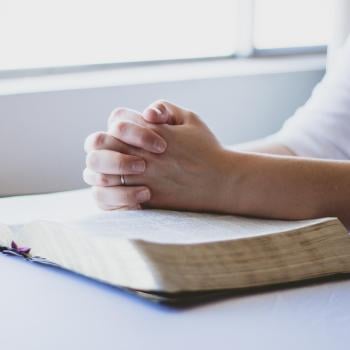
“My house is on fire! my house is on fire!” a neighbor pleaded with me for help.
I, of course, did nothing about it.
“It is the blue one on the corner near the . . .” they attempted to continue before I interrupted.
“Whoa. Wait a minute. Why are you trying to bring which house it is into this? Am I supposed to believe that your house is any more important than any other house?”
“Because my house is on fire!” My neighbor responded with a somewhat exasperated and at the same time puzzled response.
“Well, that may be. But we don’t need to make this about your house. After all, don’t all houses matter?” I replied.
“Sure, all houses matter. But mine really matters right now, because it is on fire. Can you help me?”
“Well, I would love to help. But, if I help you, then what about the next person that comes along and tries to tell me that their house is special and needs attention? Will I not be constantly helping people? And doesn’t my house matter also?” I kindly replied.
Now, you may say, “but his house is on fire!”
I know, but, seriously, why can’t these people be responsible enough to make sure that their homes don’t catch fire?
This may sound incredulous, and it does, but this is what we are saying when we reply to “Black Lives Matter” with “all lives matter.”
When someone replies, “all lives matter” they are missing the point. After all, those who affirm “Black Lives Matter” (BLM) are not saying other lives don’t. They are saying that we live in a system in which black lives often don’t matter. They are saying that at this point in time we live in a system in which a police officer can kneel on the neck of a black man for more than 8 mins until he dies: All the while the man is crying out “I can’t breathe.” If this man’s life mattered, then why didn’t the other police officers do something about it?
When people are saying the Black Lives Matter, they are crying out about a system in which black men are incarcerated at a rate 6x higher than white men for drug use even though drug use among white and black men are nearly identical[1] and usage among white youth is actually higher than among black young men.[2] Yet, the fact is that 1 out of every 17 white men in the US are incarcerated, while 1 out of every 3 black men, and 1 out of every 6 Latino men are incarcerated.
The statistics are the same for women as well. 1 in 111 white women are incarcerated, while 1 out of every 18 black women and 1 in every 44 Latino women are incarcerated.
This is what the Black Lives Matter movement is saying. They are not saying that all lives do not matter. They are saying that right now Black Lives Matter. We have a national emergency on our hands. Failing to address the epidemic of systemic racism will make Covid-19 look like a bad cold.
When someone says, “all lives matter,” they are, in effect, saying, “sorry for your cough, you might want to get that looked at.”
Now, others might look at the BLM movement and note that there are elements of it that we might not agree with. This is tantamount to saying that I cannot belong to a certain denomination because I do not agree with every aspect of it. No one does.
I have worked at a number of institutions in which I have had to sign the Westminster Confession of faith. Every time I do so, I am allowed to state that, though I agree with the confession as a whole, I do not agree with various parts. When someone affirms BLM, that does not mean that they are affirming everything that BLM stands for or has stood for. It seems as though, whenever, white people want to support BLM, we have to give these asterisks.
BLM never said, nor intended to say, “only Black lives matter.”
If we were to say the “women’s lives matter” in reference to thousands of young women enslaved in sex trafficking, would people respond with “all lives matter?”
If we were to say that “children’s lives matter” in reference to childhood poverty, would people respond with “all lives matter?”
If we were to say that “persons with special needs lives matters” in reference to the discrimination that they face, would people respond with “all lives matter?”
If we were to say that “veteran’s lives matter” in reference to the discrimination they face, would people respond with “all lives matter?”
If we were to say that “refugees lives matter” in reference to the discrimination they face would people respond with “all lives matter?”
When people are faced with discrimination and hardship it is right and just and fair to cry out and say that “all lives matter?”
Why, then, is okay to reply to Black Lives Matter, with “all lives matter”? Doing so fails to grasp the significance of the specific issues people of color face in the United States.
One pastor I know posted, “we should say ‘Black Lives Matter’ because it is the Gospel not politics.” Stop making this a partisan issue. This is a human issue. Black Lives Matter.
[1] U.S. Department of Health and Human Services, Substance Abuse and Mental Health Services Administration, Summary of Findings from the 2000 National Household Survey on Drug Abuse, NHSDA series H-13, DHHS pub. no. SMA 01-3549 (Rockville, MD: 2001), reporting that 6.4 percent of whites, 6.4 percent of blacks, and 5.3 percent of Hispanics were current users of illegal drugs in 2000; Results from the 2002 National Survey on Drug Use and Health: National Findings, NHSDA series H-22, DHHS pub. no. SMA 03-3836 (2003), revealing nearly identical rates of illegal drug use among whites and blacks, only a single percentage point between them; and Results from the 2007 National Survey on Drug Use and Health: National Findings, NSDUH series H-34, DHHS pub. no. SMA 08-4343 (2007), showing essentially the same finding. See also Marc Mauer and Ryan S. King, A 25-Year Quagmire: The “War on Drugs” and Its Impact on American Society (Washington, DC: Sentencing Project, 2007), 19, citing a study suggesting that African Americans have slightly higher rates of illegal drug use than whites. Cited in Alexander, Michelle. The New Jim Crow (p. 332). The New Press. Kindle Edition.
[2] Howard N. Snyder and Melissa Sickman, Juvenile Offenders and Victims: 2006 National Report, U.S. Department of Justice, Office of Justice Programs, Office of Juvenile Justice and Delinquency Prevention (Washington, DC: U.S. Department of Justice, 2006), reporting that white youth are more likely than black youth to engage in illegal drug sales. See also Lloyd D. Johnson, Patrick M. O’Malley, Jerald G. Bachman, and John E. Schulenberg, Monitoring the Future, National Survey Results on Drug Use, 1975–2006, vol. 1, Secondary School Students, U.S. Department of Health and Human Services, National Institute on Drug Abuse, NIH pub. no. 07-6205 (Bethesda, MD: 2007), 32, “African American 12th graders have consistently shown lower usage rates than White 12th graders for most drugs, both licit and illicit”; and Lloyd D. Johnston, Patrick M. O’Malley, and Jerald G. Bachman, Monitoring the Future: National Results on Adolescent Drug Use: Overview of Key Findings 2002, U.S. Department of Health and Human Services, National Institute on Drug Abuse, NIH pub. no. 03-5374 (Bethesda, MD: 2003), presenting data showing that African American adolescents have slightly lower rates of illicit drug use than their white counterparts. Cited in Alexander, Michelle. The New Jim Crow (p. 332). The New Press. Kindle Edition.












